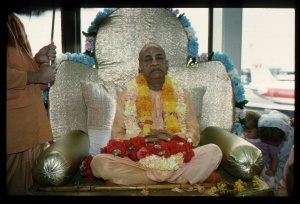CC Madhya 19.71: Difference between revisions
m (1 revision(s)) |
(Vanibot #0054 edit - transform synonyms into clickable links, which search similar occurrences) |
||
| (One intermediate revision by one other user not shown) | |||
| Line 1: | Line 1: | ||
{{ | [[Category:Sri Caitanya-caritamrta - Madhya-lila Chapter 19|C071]] | ||
<div style="float:left">'''[[Sri Caitanya-caritamrta|Śrī Caitanya-caritāmṛta]] - [[CC Madhya|Madhya-līlā]] - [[CC Madhya 19|Chapter 19: Lord Śrī Caitanya Mahāprabhu Instructs Śrīla Rūpa Gosvāmī]]'''</div> | |||
<div style="float:right">[[File:Go-previous.png|link=CC Madhya 19.70|Madhya-līlā 19.70]] '''[[CC Madhya 19.70|Madhya-līlā 19.70]] - [[CC Madhya 19.72|Madhya-līlā 19.72]]''' [[File:Go-next.png|link=CC Madhya 19.72|Madhya-līlā 19.72]]</div> | |||
{{CompareVersions|CC|Madhya 19.71|CC 1975|CC 1996}} | |||
{{RandomImage}} | |||
==== TEXT 71 ==== | ==== TEXT 71 ==== | ||
<div | <div class="verse"> | ||
‘duṅhāra mukhe kṛṣṇa-nāma kariche nartana | :‘duṅhāra mukhe kṛṣṇa-nāma kariche nartana | ||
ei-dui ‘adhama’ nahe, haya ‘sarvottama’ | :ei-dui ‘adhama’ nahe, haya ‘sarvottama’ | ||
</div> | </div> | ||
| Line 12: | Line 16: | ||
==== SYNONYMS ==== | ==== SYNONYMS ==== | ||
<div | <div class="synonyms"> | ||
duṅhāra | ''[//vanipedia.org/wiki/Special:VaniSearch?s=duṅhāra&tab=syno_o&ds=1 duṅhāra] [//vanipedia.org/wiki/Special:VaniSearch?s=mukhe&tab=syno_o&ds=1 mukhe]'' — in the mouths of both; ''[//vanipedia.org/wiki/Special:VaniSearch?s=kṛṣṇa&tab=syno_o&ds=1 kṛṣṇa]-[//vanipedia.org/wiki/Special:VaniSearch?s=nāma&tab=syno_o&ds=1 nāma]'' — the holy name of Lord Kṛṣṇa; ''[//vanipedia.org/wiki/Special:VaniSearch?s=kariche&tab=syno_o&ds=1 kariche]'' — is doing; ''[//vanipedia.org/wiki/Special:VaniSearch?s=nartana&tab=syno_o&ds=1 nartana]'' — dancing; ''[//vanipedia.org/wiki/Special:VaniSearch?s=ei&tab=syno_o&ds=1 ei]-[//vanipedia.org/wiki/Special:VaniSearch?s=dui&tab=syno_o&ds=1 dui]'' — both of them; ''[//vanipedia.org/wiki/Special:VaniSearch?s=adhama&tab=syno_o&ds=1 adhama] [//vanipedia.org/wiki/Special:VaniSearch?s=nahe&tab=syno_o&ds=1 nahe]'' — not fallen; ''[//vanipedia.org/wiki/Special:VaniSearch?s=haya&tab=syno_o&ds=1 haya]'' — are; ''[//vanipedia.org/wiki/Special:VaniSearch?s=sarva&tab=syno_o&ds=1 sarva]-[//vanipedia.org/wiki/Special:VaniSearch?s=uttama&tab=syno_o&ds=1 uttama]'' — the most exalted. | ||
</div> | </div> | ||
| Line 19: | Line 23: | ||
==== TRANSLATION ==== | ==== TRANSLATION ==== | ||
<div | <div class="translation"> | ||
Vallabha Bhaṭṭācārya said, “Since these two are constantly chanting the holy name of Kṛṣṇa, how can they be untouchable? On the contrary, they are most exalted.” | Vallabha Bhaṭṭācārya said, “Since these two are constantly chanting the holy name of Kṛṣṇa, how can they be untouchable? On the contrary, they are most exalted.” | ||
</div> | </div> | ||
| Line 26: | Line 30: | ||
==== PURPORT ==== | ==== PURPORT ==== | ||
<div | <div class="purport"> | ||
Vallabha Bhaṭṭācārya’s admission of the brothers’ exalted position should serve as a lesson to one who is falsely proud of his position as a brāhmaṇa. Sometimes so-called brāhmaṇas do not recognize our European and American disciples as devotees or brāhmaṇas, and some brāhmaṇas are so proud that they do not allow them to enter temples. Śrī Caitanya Mahāprabhu herein gives a great lesson. Although Vallabha Bhaṭṭācārya was a great authority on brahmanism and a learned scholar, he admitted that those who chant the Lord’s holy name are bona fide brāhmaṇas and Vaiṣṇavas and are therefore exalted. | Vallabha Bhaṭṭācārya’s admission of the brothers’ exalted position should serve as a lesson to one who is falsely proud of his position as a ''brāhmaṇa''. Sometimes so-called ''brāhmaṇas'' do not recognize our European and American disciples as devotees or ''brāhmaṇas'', and some ''brāhmaṇas'' are so proud that they do not allow them to enter temples. Śrī Caitanya Mahāprabhu herein gives a great lesson. Although Vallabha Bhaṭṭācārya was a great authority on brahmanism and a learned scholar, he admitted that those who chant the Lord’s holy name are bona fide ''brāhmaṇas'' and Vaiṣṇavas and are therefore exalted. | ||
</div> | </div> | ||
__NOTOC__ | |||
<div style="float:right; clear:both;">[[File:Go-previous.png|link=CC Madhya 19.70|Madhya-līlā 19.70]] '''[[CC Madhya 19.70|Madhya-līlā 19.70]] - [[CC Madhya 19.72|Madhya-līlā 19.72]]''' [[File:Go-next.png|link=CC Madhya 19.72|Madhya-līlā 19.72]]</div> | |||
__NOTOC__ | |||
__NOEDITSECTION__ | |||
Latest revision as of 22:31, 19 February 2024

A.C. Bhaktivedanta Swami Prabhupada
TEXT 71
- ‘duṅhāra mukhe kṛṣṇa-nāma kariche nartana
- ei-dui ‘adhama’ nahe, haya ‘sarvottama’
SYNONYMS
duṅhāra mukhe — in the mouths of both; kṛṣṇa-nāma — the holy name of Lord Kṛṣṇa; kariche — is doing; nartana — dancing; ei-dui — both of them; adhama nahe — not fallen; haya — are; sarva-uttama — the most exalted.
TRANSLATION
Vallabha Bhaṭṭācārya said, “Since these two are constantly chanting the holy name of Kṛṣṇa, how can they be untouchable? On the contrary, they are most exalted.”
PURPORT
Vallabha Bhaṭṭācārya’s admission of the brothers’ exalted position should serve as a lesson to one who is falsely proud of his position as a brāhmaṇa. Sometimes so-called brāhmaṇas do not recognize our European and American disciples as devotees or brāhmaṇas, and some brāhmaṇas are so proud that they do not allow them to enter temples. Śrī Caitanya Mahāprabhu herein gives a great lesson. Although Vallabha Bhaṭṭācārya was a great authority on brahmanism and a learned scholar, he admitted that those who chant the Lord’s holy name are bona fide brāhmaṇas and Vaiṣṇavas and are therefore exalted.